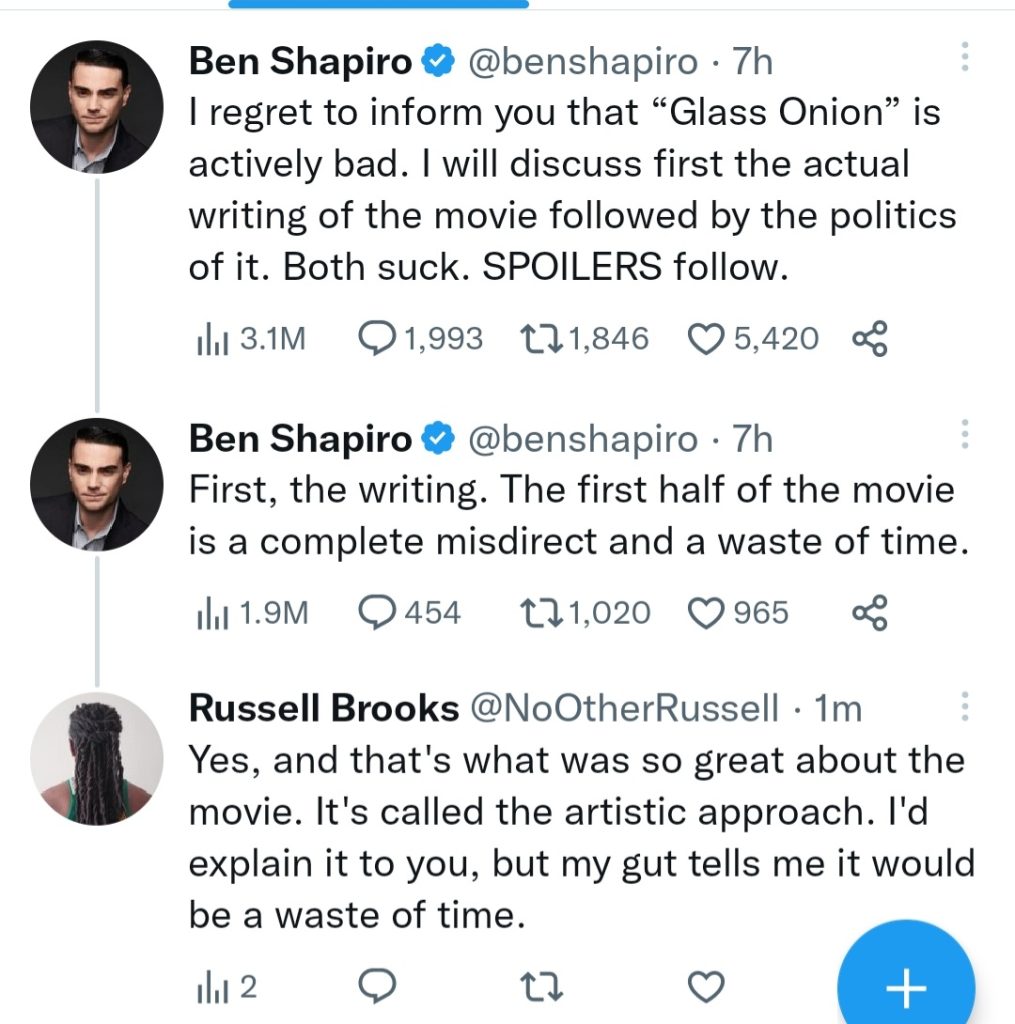Ben Shapiro’s unhinged rant against Netflix’s Glass Onion: A Knives Out Mystery reminds us why we should not take certain critics seriously.

Conservative pundit Ben Shapiro took to Twitter on Boxing Day to unleash an unhinged spoiler-filled rant on why he thought Glass Onion: A Knives Out Mystery was a lousy movie. Out of his seventeen-post thread, I only read two before I realized that Ben Shapiro was using his platform to attack Rian Johnson, the author of the series. The responses to his tweets were hilarious and should remind Shapiro that people are knowledgeable enough to spot a fake reviewer. The fact is, Ben Shapiro’s rant only drew more attention to the movie. Thus, his childish temper tantrum spectacularly backfired.
When you read reviews about movies or books, it’s always important to stick to a reviewer that you trust and whose reviews are consistent with your thoughts about the films you watched or the books you’ve read. What’s laughable about Shapiro’s childish rant is the part he criticized was, in my opinion, some of the most clever writing I’ve witnessed. It’s clear that Shapiro lacks experience writing a murder mystery (or any fiction) because misdirection is an essential technique an author uses to keep the audience engaged.
Types of reviews
As an author, I’ve received both good and bad reviews. I read many because it’s always encouraging to know your work is appreciated. Do I let myself be bothered by the bad reviews? Absolutely not. There’s never a unique reason why someone may not enjoy my work. Some people may not relate to the characters, not enjoy the author’s voice, or care for the genre. That happens to every author.
I’ve also encountered situations where readers clearly did not read the book and wrote a negative review to attack the author. In the industry, we refer to those reviewers as “sock-puppets.” A dead giveaway is when they hide behind fake names to write fake reviews to attack the author. In my career, I’ve only called one of them out by exposing the numerous factual errors he made about the story. I also reminded him that tearing down an author to boost sales for his books would backfire.
As tempting as it is to respond to negative reviews that are written out of malice, I don’t waste my time. I’ve received reviews that weren’t good but were constructive criticisms. I don’t mind those because I’ve often used them to improve my writing.
There’s also the petty review, where the reader gives a book or a movie a one-star review for ridiculous reasons. I recall chatting with the late, great New York Times Bestselling author, Eric Jerome Dickie, one evening. He mentioned being invited as a guest on a show, and one of the panellists—a Black woman—told him that she did not like one of his characters—who was also a Black woman—simply because she wore her hair naturally in an Afro. For her, it wasn’t realistic for a Black woman with an Afro to hold a leadership position at a company.
No, I am not making this up.
When I wrote my first novel, Pandora’s Succession, I accepted that it would not necessarily be my best book. I acknowledged that there would be those who would either like it or not. Those who expect to please everyone are setting themselves up for disappointment. Even though I believe that reviews are an asset for every author, from my perspective, it’s vital to remember that the priority is to write for oneself before others.
This is why people such as Shapiro ought to be ignored. He’s not a reviewer. He’s a political pundit. He attacked Glass Onion: A Knives Out Mystery because he has an axe to grind with Rian Johnson for his political leanings. My accountant told me a few years ago: “Some people are against anything and everything. There is nothing you can do to help them.” Ben Shapiro fits this category. If there’s one takeaway from witnessing Shapiro’s meltdown is that authors don’t need to respond to unhinged and fake reviews, the fans will do so. And if the author’s fortunate, those responses will help generate more free publicity for their work.



